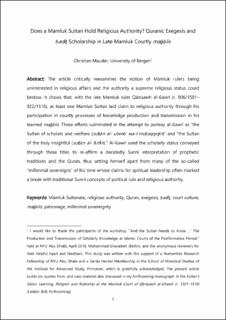Does a Mamluk Sultan Hold Religious Authority? Quranic Exegesis and ḥadīṯ Scholarship in Late Mamluk Courtly maǧālis
Journal article, Peer reviewed
Accepted version

Åpne
Permanent lenke
https://hdl.handle.net/11250/3127238Utgivelsesdato
2023Metadata
Vis full innførselSamlinger
Originalversjon
Intellectual History of the Islamicate World. 2023, 11, 80-111. 10.1163/2212943X-12340004Sammendrag
The article critically reexamines the notion of Mamluk rulers being uninterested in religious affairs and the authority a supreme religious status could bestow. It shows that, with the late Mamluk ruler Qāniṣawh al-Ġawrī (r. 906/1501–922/1516), at least one Mamluk sultan laid claim to religious authority through his participation in courtly processes of knowledge production and transmission in his learned maǧālis. These efforts culminated in the attempt to portray al-Ġawrī as “the sultan of scholars and verifiers (sulṭān al-ʿulamāʾ wa-l-muḥaqqiqīn)” and “the sultan of the truly insightful (sulṭān al-ʿārifīn).” Al-Ġawrī used the scholarly status conveyed through these titles to re-affirm a decidedly Sunni interpretation of prophetic traditions and the Quran, thus setting himself apart from many of the so-called “millennial sovereigns” of his time whose claims for spiritual leadership often marked a break with traditional Sunni concepts of political rule and religious authority.